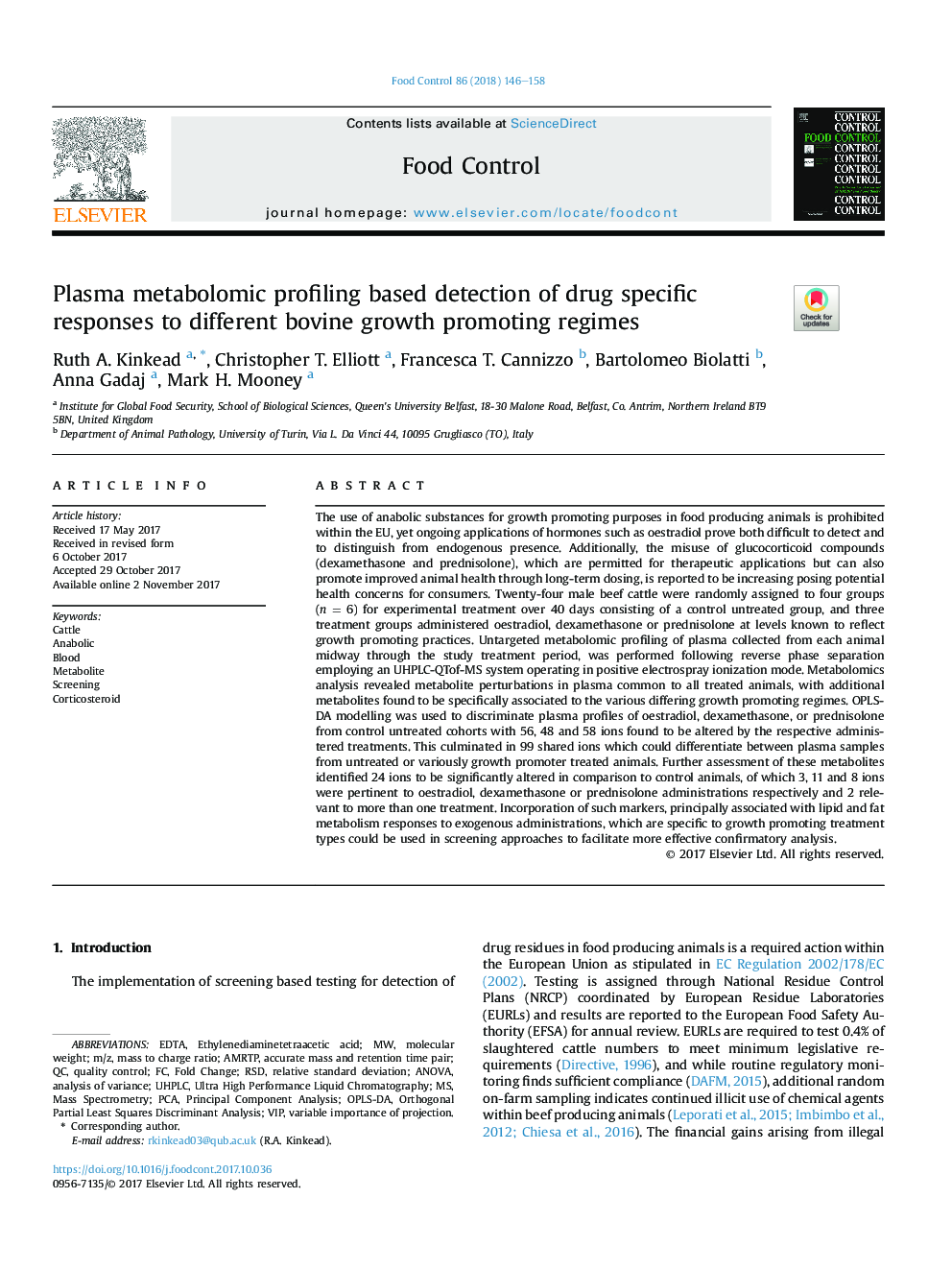| کد مقاله | کد نشریه | سال انتشار | مقاله انگلیسی | نسخه تمام متن |
|---|---|---|---|---|
| 8888142 | 1628378 | 2018 | 13 صفحه PDF | دانلود رایگان |
عنوان انگلیسی مقاله ISI
Plasma metabolomic profiling based detection of drug specific responses to different bovine growth promoting regimes
ترجمه فارسی عنوان
شناسایی متابولیک های پلاسما بر اساس شناسایی پاسخ های خاص دارو به رژیم های مختلف رشد
دانلود مقاله + سفارش ترجمه
دانلود مقاله ISI انگلیسی
رایگان برای ایرانیان
کلمات کلیدی
OPLS-DAUHPLCRSDVIPm/z - m / zPCA - PCAAnabolic - آنابولیکEDTA - اتیلن دی آمین تترا استیک اسید Ethylenediaminetetraacetic acid - اتیلینیدامین تتراستیک اسیدrelative standard deviation - انحراف استاندارد نسبیorthogonal partial least squares discriminant analysis - تجزیه و تحلیل تقریبا جزئی ترین خرده مقادیر جزئی متعامدPrincipal component analysis - تحلیل مولفههای اصلی یا PCAanalysis of variance - تحلیل واریانسANOVA - تحلیل واریانس Analysis of variancefold change - تغییر در برابرBlood - خونMass spectrometry - طیف سنجی جرمیScreening - غربالگریMetabolite - متابولیتmass to charge ratio - نسبت جرم به شارژMolecular weight - وزن مولکولیUltra High Performance Liquid Chromatography - کروماتوگرافی مایع با کارایی فوق العاده بالاquality control - کنترل کیفیتCorticosteroid - کورتیکواستروئیدها Cattle - گاو
موضوعات مرتبط
علوم زیستی و بیوفناوری
علوم کشاورزی و بیولوژیک
دانش تغذیه
چکیده انگلیسی
The use of anabolic substances for growth promoting purposes in food producing animals is prohibited within the EU, yet ongoing applications of hormones such as oestradiol prove both difficult to detect and to distinguish from endogenous presence. Additionally, the misuse of glucocorticoid compounds (dexamethasone and prednisolone), which are permitted for therapeutic applications but can also promote improved animal health through long-term dosing, is reported to be increasing posing potential health concerns for consumers. Twenty-four male beef cattle were randomly assigned to four groups (n = 6) for experimental treatment over 40 days consisting of a control untreated group, and three treatment groups administered oestradiol, dexamethasone or prednisolone at levels known to reflect growth promoting practices. Untargeted metabolomic profiling of plasma collected from each animal midway through the study treatment period, was performed following reverse phase separation employing an UHPLC-QTof-MS system operating in positive electrospray ionization mode. Metabolomics analysis revealed metabolite perturbations in plasma common to all treated animals, with additional metabolites found to be specifically associated to the various differing growth promoting regimes. OPLS-DA modelling was used to discriminate plasma profiles of oestradiol, dexamethasone, or prednisolone from control untreated cohorts with 56, 48 and 58 ions found to be altered by the respective administered treatments. This culminated in 99 shared ions which could differentiate between plasma samples from untreated or variously growth promoter treated animals. Further assessment of these metabolites identified 24 ions to be significantly altered in comparison to control animals, of which 3, 11 and 8 ions were pertinent to oestradiol, dexamethasone or prednisolone administrations respectively and 2 relevant to more than one treatment. Incorporation of such markers, principally associated with lipid and fat metabolism responses to exogenous administrations, which are specific to growth promoting treatment types could be used in screening approaches to facilitate more effective confirmatory analysis.
ناشر
Database: Elsevier - ScienceDirect (ساینس دایرکت)
Journal: Food Control - Volume 86, April 2018, Pages 146-158
Journal: Food Control - Volume 86, April 2018, Pages 146-158
نویسندگان
Ruth A. Kinkead, Christopher T. Elliott, Francesca T. Cannizzo, Bartolomeo Biolatti, Anna Gadaj, Mark H. Mooney,
